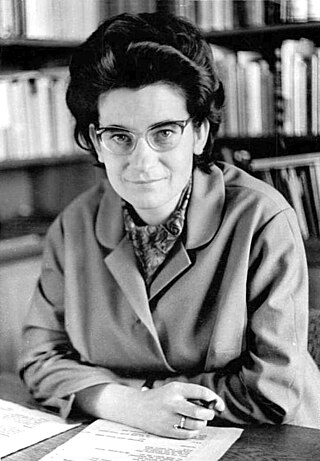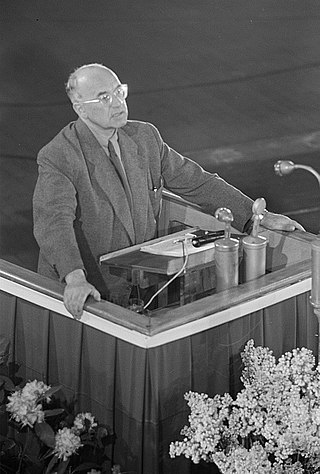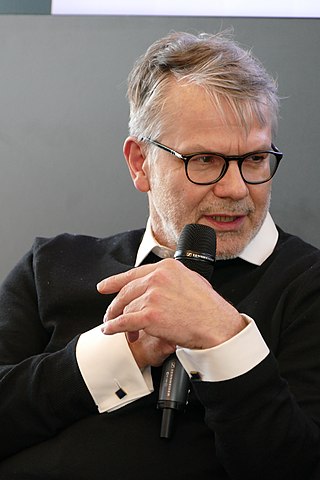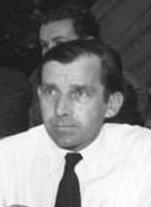
Christa Wolf was a German novelist and essayist. She is considered one of the most important writers to emerge from the former East Germany.

Johannes Robert Becher was a German politician, novelist, and poet. He was affiliated with the Communist Party of Germany (KPD) before World War II. At one time, he was part of the literary avant-garde, writing in an expressionist style.

Stephan Hermlin, real name Rudolf Leder, was a German author. He wrote, among other things, stories, essays, translations, and lyric poetry and was one of the more well-known authors of former East Germany.

Peter Huchel, born Hellmut Huchel, was a German poet and editor.

Volker Braun is a German writer. His works include Provokation für mich – a collection of poems written between 1959 and 1964 and published in 1965, a play, Die Kipper, and Das ungezwungene Leben Kasts (1972).

Durs Grünbein is a German poet and essayist.

Willi Baumeister was a German painter, scenic designer, art professor, and typographer. His work was part of the art competitions at the 1928 Summer Olympics and the 1932 Summer Olympics.

Friederike Mayröcker was an Austrian writer of poetry and prose, radio plays, children's books and dramatic texts. She experimented with language, and was regarded as an avantgarde poet, and as one of the leading authors in German. Her work, inspired by art, music, literature and everyday life, appeared as "novel and also dense text formations, often described as 'magical'." According to The New York Times, her work was "formally inventive, much of it exploiting the imaginative potential of language to capture the minutiae of daily life, the natural world, love and grief".

Günter de Bruyn was a German author.
Wolfgang Hilbig was a German writer and poet.
Adolf Endler was a lyric poet, essayist and prose author who played a central role in subcultural activities that attacked and challenged an outdated model of socialist realism in the German Democratic Republic up until the collapse of communism in the early 1990s. Endler drew attention to himself as the "father of the oppositional literary scene" at Prenzlauer Berg in the eastern part of Berlin. In 2005 he was made a member of the Deutsche Akademie für Sprache und Dichtung in Darmstadt.

Bodo Uhse was a German writer, journalist and political activist. He was recognised as one of the most prominent authors in East Germany.

The Berliner Kunstpreis, officially Großer Berliner Kunstpreis, is a prize for the arts by the City of Berlin. It was first awarded in 1948 in several fields of art. Since 1971, it has been awarded by the Academy of Arts on behalf of the Senate of Berlin. Annually one of its six sections, fine arts, architecture, music, literature, performing arts and film and media arts, gives the great prize, endowed with €15,000, whereas the other five sections annually award prizes endowed with €5,000.

Herbert Sandberg was a German artist and caricaturist. He was best known for his caricatures in the satirical magazine, Ulenspiegel, which he co-founded and art directed. He is also well known for his drawings of Bertolt Brecht and for his column, Der freche Zeichenstift in the magazine, Das Magazin. A member of the Communist Party, a Jew, and a German Resistance fighter, Sandberg spent 10 years in a Nazi prison and in Buchenwald concentration camp. He conceived the idea for Ulenspiegel while a prisoner there and began working on it almost immediately on liberation.
"Ermutigung" ("Encouragement") is a poem and song by the German Liedermacher and lyricist Wolf Biermann. It was first published in 1968 in the poetry collection Mit Marx- und Engelszungen by Verlag Klaus Wagenbach, which also released the poem set to music as part of the single 4 neue Lieder. Biermann later released the song on his 1974 LP album aah-ja!, released by Columbia Records.

Lutz Seiler is a German poet and novelist. Considered one of the most important German poets living today, he is the author of numerous books of poetry, prose, and essays, and gained national attention for his debut novel Kruso. In 2023 he was awarded the Georg Büchner Prize, the most prestigious award for German literature. He has served as the literary director and custodian of the Peter Huchel Museum since 1997.

Jürgen Becker is a German poet, prose writer and radio play author. He won the 2014 Georg Büchner Prize.

Peter Hamm was a German poet, author, journalist, editor, and literary critic. He wrote several documentaries, including ones about Ingeborg Bachmann and Peter Handke. He wrote for the German weekly newspapers Der Spiegel and Die Zeit, among others. From 1964 to 2002, Hamm worked as contributing editor for culture for the broadcaster Bayerischer Rundfunk. He was also a jury member of literary prizes, and critic for a regular literary club of the Swiss television company Schweizer Fernsehen.

Karl Scheffler was a German art critic and publicist.
Marie-Luise Scherer was a German writer and journalist.
















